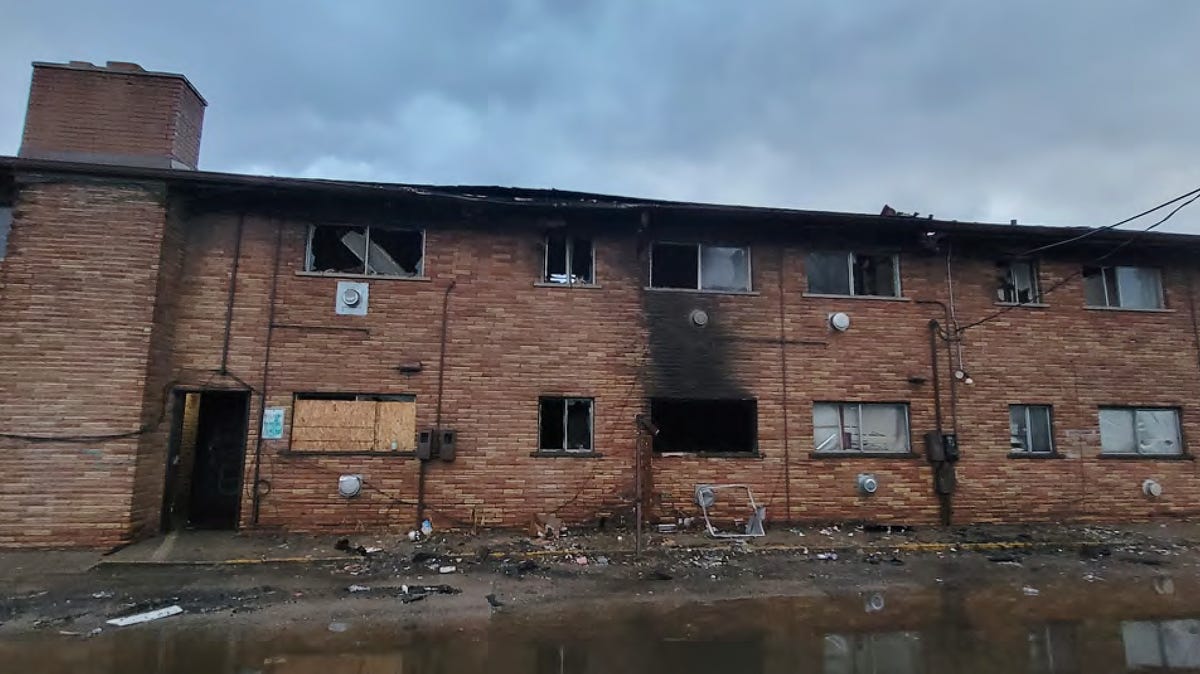Detroit — City officials said they filed the largest nuisance abatement lawsuit in Detroit’s history Wednesday against a pair of Florida-based brothers believed to be linked to a network of cryptocurrency real estate companies that control more than 400 city properties with rampant blight and nuisance violations.
Many are rental properties in low-income neighborhoods, while others are vacant and so dilapidated that city officials said they consider them public health threats. The properties are owned by investors, most often foreign, who bought fractional ownership — often through cryptocurrency. The suit filed in Wayne County Circuit Court lists 53 separate properties described as “priority one,” meaning they are considered “unquestionably harmful to the health, safety or welfare of the public,” according to the lawsuit.
The lawsuit is against Boca Raton, Fla.-based Real Token, the brothers Remy and Jean-Marc Jacobson, and their 165 affiliated “corporate defendants” for public nuisance violations involving over 400 residential properties in Detroit. Real Token, which does business as RealT, and its network of “shell corporations and affiliates” neglected its responsibility to ensure that hundreds of properties complied with basic health and safety requirements, city officials said Wednesday.
The RealT website promises “6-16%” in average rental income a year to investors, but it wasn’t clear if it is promising gains of 6% to 16%. The website says RealT has attracted more than 65,000 investors in properties. Many of those investors are not based in the United States.
The company is currently advertising 10 Michigan properties on social media that foreign investors can own a piece of for around $50. The sale is not available for U.S. residents.
The Jacobson brothers are listed as co-founders and co-CEOs of RealT on the website.
The company in a Wednesday email blamed the conditions on “several unscrupulous property management companies.”
“These companies were paid hundreds of thousands of dollars to oversee Real Token’s properties, address tenant complaints and make repairs, and maintain each of our properties in accordance with City of Detroit municipal codes,” according to Real Token.
Real Token said those property management companies stole money to “the detriment of Real Token and, more importantly, the tenants we serve.”
The company had not been served the city’s lawsuit and couldn’t comment on it, according to the email.
City Councilman James Tate and others rejected the argument that the blame lies with third party property management companies. The lawsuit contended the city sent “numerous correction orders” and other warnings directly to Real Token that didn’t result in any corrective actions.
“When I started hearing about what was going on, I was curious,” Tate said at a Wednesday press conference held in an empty lot in the Brightmoor neighborhood. “By the time I got inside some of these homes, I was furious. We’re talking about roofs that are leaking. Poor sewage leaking in the basements.
Many locations have standing water, the councilman added.
Tate said 408 properties don’t have a complete certification of compliance.
“They feel they can do this to folks that are in the most vulnerable situation,” he said about the company.
Tate said months ago he and some tenants at the properties held meetings with the property managers at various locations, but the meetings didn’t result in any improvements.
The lawsuit seeks a number of remedies, said Detroit Corporation Counsel Conrad Mallett.
“First of all, we want our $500,000 in tickets,” Mallett said, referring to various nuisance and blight violations. “Two, we want all of these properties to pass a compliance inspection, which will entitle them to a certificate of compliance. And if you can’t get a certificate of compliance, fix the property so that you are eligible to get the ordinance-required certification that you need.”
The city is also seeking to hold the Jacobson brothers “personally liable for the circumstances that their tenants find themselves in,” the corporation counsel said. “We are also asking the judge to take control of the entire process so that even the vacant properties are properly attended to, properly registered, and that the tenants who live therein are able, while all these repairs are going on, to put their rent in escrow.”
Real Token said it has been making repairs consistently.
“We know that nobody is going to feel sorry for Real Token and we have taken full responsibility for our mistakes: That is why since December 1st 2024, we have invested in our property management company to directly manage our properties, and instituted comprehensive checks and balances to ensure something like this never happens again,” the company’s email statement.
The company added: “We took over all the properties at once and started addressing blight violations, administrative filings, servicing maintenance calls and conducting full rehabs. We have made complete repairs to over several dozens of properties, addressed hundreds of blight tickets, and have contractor teams in the field every day addressing each disgruntled tenant and city citation in turn. This process cannot happen overnight. It takes time. But we are committed to addressing every issue, and finally execute on our original mission.”
laguilar@detroitnews.com

